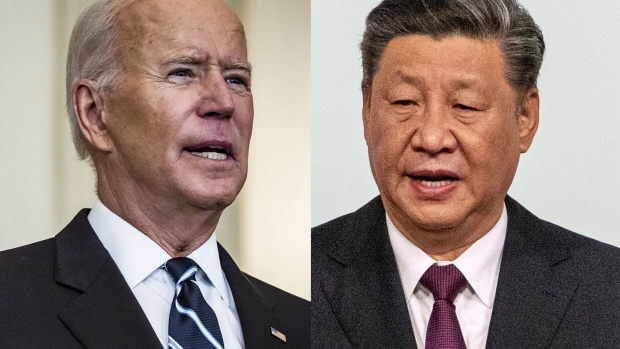Nov 10, 2022
Biden to Meet China’s Xi Nov. 14 in Bid to Buoy Strained Ties
, Bloomberg News

(Bloomberg) -- President Joe Biden’s top national security aide said the US will brief Taiwanese officials on the president’s upcoming meeting with China’s Xi Jinping and expressed confidence that Taipei would feel secure about its support from the US.
“I’m confident that they will feel very secure and comfortable in the United States, his position when it comes to our support for peace and stability across the Taiwan Strait and our commitment to the Taiwan Relations Act, which does commit the United States to ensuring we’re providing the articles for Taiwan’s defense,” National Security Advisor Jake Sullivan told reporters Thursday.
Biden on Wednesday stopped short of committing to defending the island militarily, as he’s done several times in the past. When asked how Taiwan should interpret his comments, Sullivan said the president prefers not to preview what he tells foreign leaders before their meetings but instead “likes to actually go say it to them.”
Chinese Foreign Ministry spokesman Zhao Lijian said Friday at a regular press conference in Beijing that any briefing for Taiwan officials on the Xi-Biden talks would be “a great violation of the one-China principle.”
Biden will seek to set a floor to prevent US-China ties from deteriorating further when he meets Xi on Nov. 14 in Bali, Indonesia, a senior Biden administration official said.
The official, who briefed reporters earlier Thursday, said the meeting’s main objective was for Biden and Xi to deepen their understanding of each other’s priorities and intentions -- and to set so-called rules of the road.
That’s a goal that the White House has been seeking since the leaders’ first call in 2021.
Taiwan is likely to loom large after Biden’s previous assurances to defend the island in the event of a Chinese attack, despite the US’s longstanding One China policy of maintaining “strategic ambiguity” about its commitment to intervene militarily. Biden said Wednesday he was “going to have that conversation” with Xi, adding that US policy toward Taiwan “has not changed at all.”
The two leaders also will discuss the war in Ukraine, recent North Korean nuclear activity, efforts to curb climate change and other areas where the nations can work together, the official said.
In the latest sign the White House isn’t expecting any tangible policy breakthroughs from Biden and Xi’s first face-to-face meeting, the official said the session during the Group of 20 summit in Indonesia was not being driven by a search for deliverables and that there would not be a joint statement from the event.
Still, Sullivan said the leaders will direct their teams to work together on a range of issues with the goal of trying to bridge differences where possible.
“That will include direction to the economic teams to address our concerns about Chinese economic practices, and to deal with some of the underlying differences of view and perspective on economic matters,” he said. “It will also involve giving direction to try to work on issues on which we do have common interest, whether it’s health, counter-narcotics, climate or other areas.”
Biden vowed Wednesday to make no “fundamental concessions” to Xi, reinforcing already low expectations for any major breakthrough in strained ties between the world’s two largest economies.
Xi’s last meeting with a US leader came in June 2019, when he reached a truce with Donald Trump that led to a trade deal six months later -- right before relations fell into a downward spiral as Covid-19 spread around the globe.
Biden said Wednesday that he expects to discuss contentious issues such as trade and Taiwan, which China has put under increased military pressure since US House Speaker Nancy Pelosi visited Taipei in August. His administration also imposed sweeping curbs on the sale of advanced chips to China, a move designed to maintain the US’s technological edge over Beijing.
Recent US measures to curb China’s access to semiconductors are not aimed more broadly at containing China, the official said, adding that it was a targeted approach to prevent Beijing from using high-end chips for advanced military applications.
The US and China have veered toward confrontation over the past few years even as they face greater calls to cooperate on trade and pressing issues like climate change, Covid-19 and Russia’s war in Ukraine.
Both are increasingly suspicious of each other’s intentions: The National Security Strategy released by Biden last month cast China as trying to supplant the US as the world’s dominant power, while a defiant Xi declared that the “rejuvenation of the Chinese nation is now on an irreversible historical course.”
With relations between the two nations at their lowest point in decades, both presidents have put some domestic uncertainty behind them in recent weeks.
Xi has secured a precedent-breaking third term as leader and stacked the Communist Party’s leadership with loyalists. Biden emerged stronger than expected from US midterm elections, telling reporters Wednesday that he plans to run for re-election in 2024, though he has yet to make a formal announcement.
Sullivan touted the bipartisan support for the Biden team’s approach to China and said the president looks forward to working with the new Congress and both parties on the issue.
“He goes out on this trip feeling like the results from Tuesday show that the American people are sending him out onto the world stage and in a very strong position,” Sullivan said.
China so far hasn’t confirmed the Xi-Biden meeting, with Foreign Ministry spokesman Zhao Lijian saying Thursday that Beijing took the US proposal “seriously” and the two sides were in communication.
Beijing was “committed to realizing mutual respect, peaceful coexistence and win-win cooperation with the US,” he added.
--With assistance from Akayla Gardner, Jordan Fabian, Nancy Cook and Colum Murphy.
(Updates with comments from China’s Foreign Ministry.)
©2022 Bloomberg L.P.





